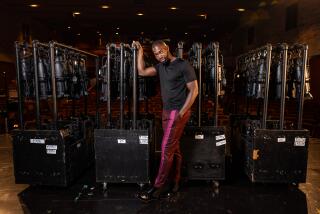O.C. THEATER / JAN HERMAN : Too Much Is Stressed in ‘Dining’
- Share via
GARDEN GROVE — If director Deborah La Vine had used a pencil instead of actors to underline everything she wants to emphasize in her staging of “The Dining Room” at the Gem Theatre, she would have been down to a nub before the second act.
Yet for all her fastidious underlining, this Grove Shakespeare Festival revival of A. R. Gurney’s nostalgia-tinged satire, about a bygone era of life among the upper crust, rarely establishes a specific sense of place or period beyond the immediately apparent setting of a formal dining room.
You’d never know, except from a few fleeting references in the dialogue, that Gurney happens to be writing about the white Anglo-Saxon Protestant culture of the Northeastern United States in particular, and not some privileged precinct of the Midwest or, worse, any generic suburbia WASP-ish enough to pass for either.
Given the scrupulous effort to treat the play like a living diorama, including a tongue-in-cheek museum tour of the premises laid on as a preamble to the action proper, this deficiency is more than just paradoxical. It is consistently annoying, even deadening (if not actually fatal) to the playfulness of Gurney’s themes.
Nevertheless, there is sufficient entertainment in a kaleidoscopic parade of types--society matrons, illicit lovers, baronial grandfathers, the recently married, the about-to-be-divorced, debutantes, kids on their birthdays and, of course, the loyal servants--to keep most of the proceedings reasonably diverting.
The theatrical pleasure comes from watching a cast of eight depicting 56 different roles, even though the tone may be wrong (as with an occasionally mustered pseudo-British accent) or a characterization may be dreamed up out of whole cloth (as when a servant comes on, to comic effect, like Quasimodo’s cousin) or subtle shifts in time from the ‘30s to the ‘60s are only vaguely delineated.
The first act is far more sketchily written than the second, which goes to the heart of Gurney’s themes. One second-act scene--between a proud old aunt and her inquiring nephew, who treats her like an anthropological specimen--virtually announces what La Vine has been underscoring throughout the evening: that there is something both grand and ludicrous in the civilized pretensions of WASP-dom. A funnier scene, about saving a brother’s honor, drives home the point.
Meanwhile, a sense of loss pervades an encounter between a father and his unhappily married daughter, who asks to return home with her children but is rebuffed. By contrast, the poignancy of love dominates a scene between a son and his father, who carefully lays out the details of his upcoming funeral in a long monologue.
The acting in almost all these scenes, however, does not rise to the level of the writing. In the first, to cite one example, the usually reliable Ursula Martin personifies old age with a gimmicky tic and falsifies everything about the dignity of the aunt’s character except her actor-proof punch line.
In the last, to cite another, the otherwise personable Vincent Ventresca simply is miscast as the father. He turns Harvey’s monologue into such a dull recitation that it makes you wish the character already were in his coffin and on his way to the cemetery.
Among the other performers in the production (the first of the Grove’s 1992 season), Charles Carroll, Caroline Shaffer, Rob Monroe and Nick Hofmann seem the most versatile.
The formal dining room is well-appointed, somewhat claustrophobic and perfectly suited to the idea that everything in life but birth and death seems to happen there. The costuming is careful and usually unobtrusive. The flat lighting leaves much to be desired, however. It never conveys the passage of time from morning to night (as Gurney suggests it should) until the play’s final moments.
‘The Dining Room’
A Grove Shakespeare Festival production of the play by A.R. Gurney. Directed by Deborah La Vine. With Karlene Bradley, Charles Carroll, Nick Hofmann, Ursula Martin, Rob Monroe, Caroline Shaffer, Kristine Tata and Vincent Ventresca. Scenic design by Don Llewellyn. Lighting by David M. Darwin. Costumes by Terri L. Holt. Stage manager: Linda Tross. Continues Wednesdays through Saturdays at 8 p.m. and Sundays at 3 and 7:30 p.m. through June 13 at the Gem Theatre, 12852 Main St., Garden Grove. $18 to $22. Running time: 2 hours, 25 minutes with one intermission. (714) 636-7213.
More to Read
The biggest entertainment stories
Get our big stories about Hollywood, film, television, music, arts, culture and more right in your inbox as soon as they publish.
You may occasionally receive promotional content from the Los Angeles Times.










